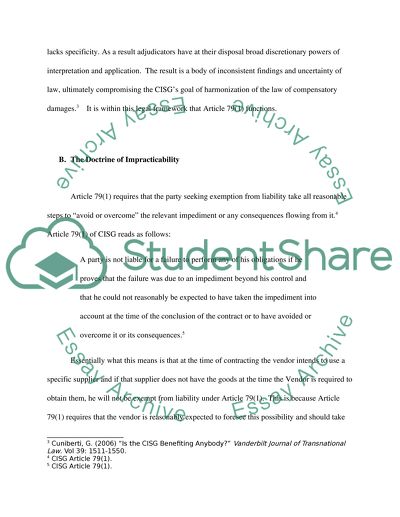Cite this document
(“[I]n the final analysis, Article 79(1) [of CISG] is ill-suited to Essay”, n.d.)
[I]n the final analysis, Article 79(1) [of CISG] is ill-suited to Essay. Retrieved from https://studentshare.org/miscellaneous/1560235-in-the-final-analysis-article-791-of-cisg-is-ill-suited-to-solving-cases-of-commercial-impracticability-schlechtriem-schwenzer-commentary-on-the-un-convention-on-the-international-sale-of-goods-cisg-oup-2nd-ed-2005-a
[I]n the final analysis, Article 79(1) [of CISG] is ill-suited to Essay. Retrieved from https://studentshare.org/miscellaneous/1560235-in-the-final-analysis-article-791-of-cisg-is-ill-suited-to-solving-cases-of-commercial-impracticability-schlechtriem-schwenzer-commentary-on-the-un-convention-on-the-international-sale-of-goods-cisg-oup-2nd-ed-2005-a
([I]n the Final Analysis, Article 79(1) [of CISG] Is Ill-Suited to Essay)
[I]n the Final Analysis, Article 79(1) [of CISG] Is Ill-Suited to Essay. https://studentshare.org/miscellaneous/1560235-in-the-final-analysis-article-791-of-cisg-is-ill-suited-to-solving-cases-of-commercial-impracticability-schlechtriem-schwenzer-commentary-on-the-un-convention-on-the-international-sale-of-goods-cisg-oup-2nd-ed-2005-a.
[I]n the Final Analysis, Article 79(1) [of CISG] Is Ill-Suited to Essay. https://studentshare.org/miscellaneous/1560235-in-the-final-analysis-article-791-of-cisg-is-ill-suited-to-solving-cases-of-commercial-impracticability-schlechtriem-schwenzer-commentary-on-the-un-convention-on-the-international-sale-of-goods-cisg-oup-2nd-ed-2005-a.
“[I]n the Final Analysis, Article 79(1) [of CISG] Is Ill-Suited to Essay”, n.d. https://studentshare.org/miscellaneous/1560235-in-the-final-analysis-article-791-of-cisg-is-ill-suited-to-solving-cases-of-commercial-impracticability-schlechtriem-schwenzer-commentary-on-the-un-convention-on-the-international-sale-of-goods-cisg-oup-2nd-ed-2005-a.


